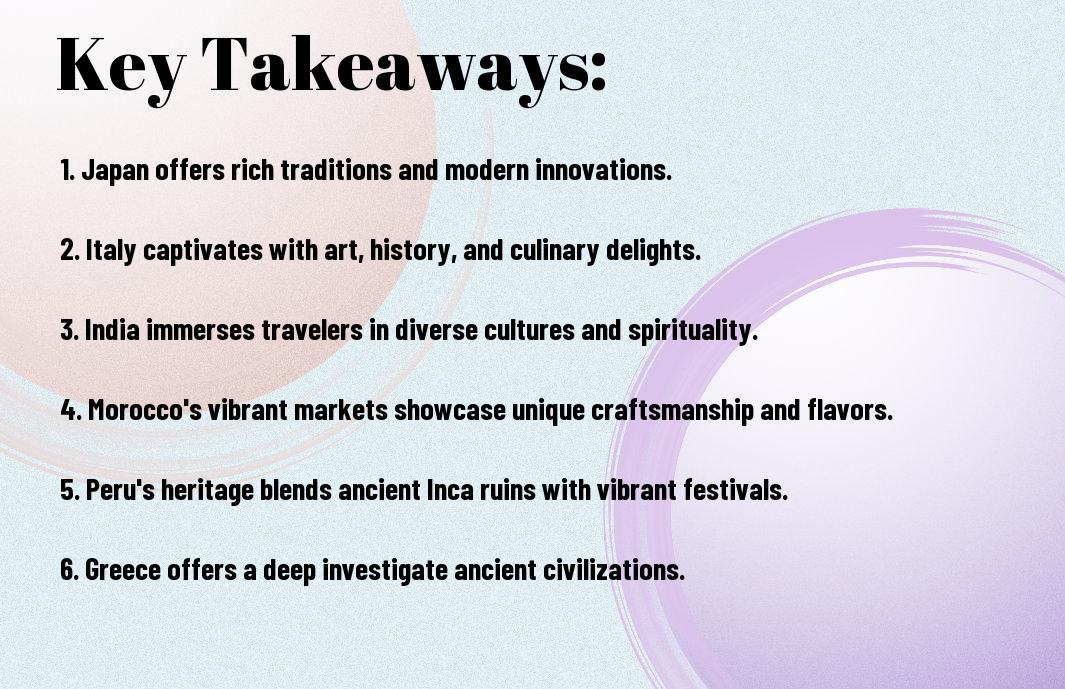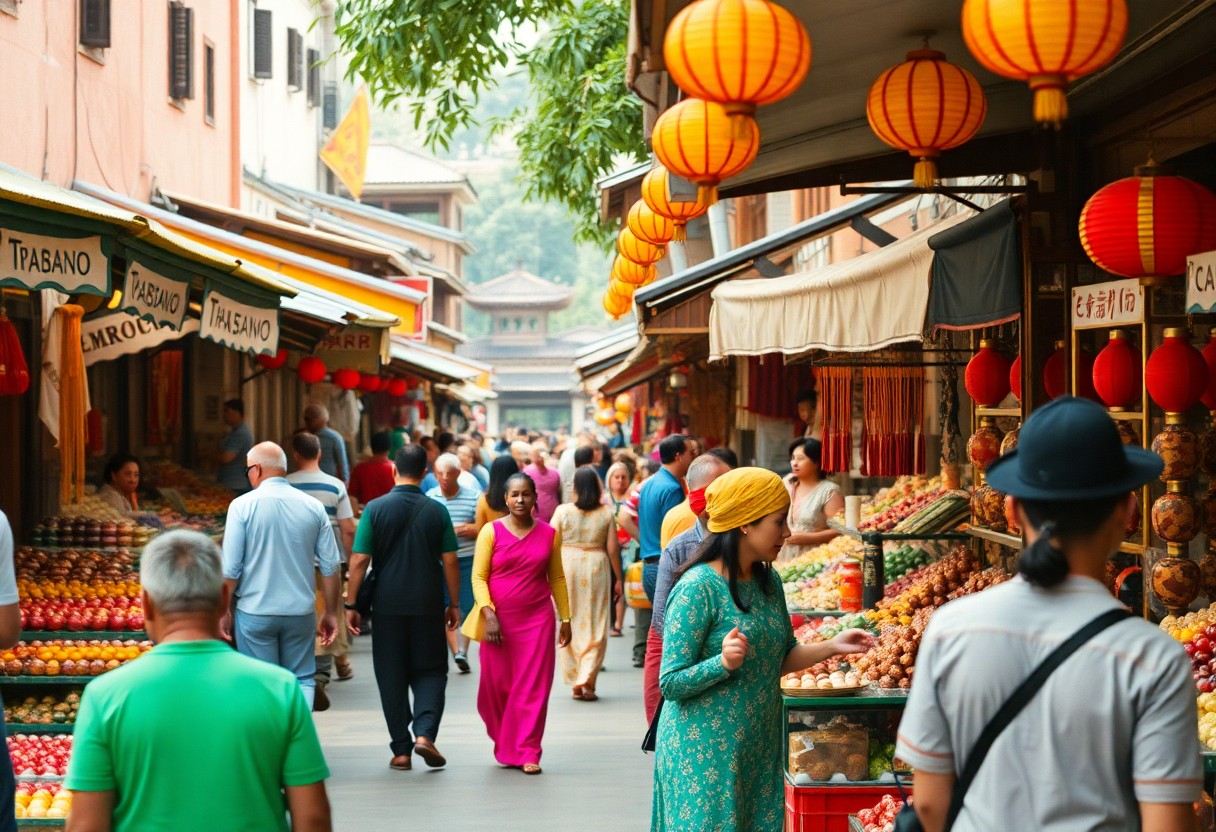With a world brimming with diverse cultures and traditions, you have countless opportunities to immerse yourself in unique experiences that enrich your understanding of various societies. This guide presents the top five destinations that offer an authentic cultural journey, allowing you to engage with local communities, savor traditional cuisines, and participate in age-old customs. Whether you’re wandering through vibrant markets, attending cultural festivals, or learning from local artisans, these destinations promise an unforgettable adventure that speaks to your sense of curiosity and wanderlust.
Key Takeaways:
- Authentic Experiences: Engage deeply with local traditions and customs that enrich understanding of the destination.
- Local Cuisine: Sampling traditional dishes allows travelers to connect with the culture through food.
- Community Interaction: Participating in community events fosters connections with locals and enhances cultural appreciation.
- Historical Context: Visiting historical sites helps travelers grasp the significance of a place’s culture and heritage.
- Workshops and Classes: Taking part in local arts or crafts workshops provides hands-on learning opportunities and cultural insight.


Destination One: Kyoto, Japan
While wandering through the enchanting streets of Kyoto, you will find yourself immersed in a world where ancient traditions meet modern aesthetics. This city is a living museum, offering a unique opportunity to explore the rich history and culture of Japan. From its tranquil temples to its stunning gardens, Kyoto invites you to dive deep into the heart of Japanese heritage.
Historical Significance
Kyoto served as Japan’s capital for over a millennium, playing a pivotal role in shaping the country’s cultural and historical landscape. The city’s ancient architecture, highlighted by UNESCO World Heritage sites such as Kinkaku-ji and Kiyomizu-dera, reflects the artistic achievements of various eras. As you stroll through its streets, you encounter the echoes of samurai, emperors, and artisans who have shaped Kyoto into the cultural epicenter it remains today.
Cultural Practices and Local Traditions
Below the surface of Kyoto’s scenic beauty lies a wealth of cultural practices and local traditions that are deeply rooted in history. You can participate in age-old ceremonies like the traditional tea ceremony or witness the artistry of kimono-making, both of which offer an authentic glimpse into Japanese customs.
Cultural practices in Kyoto are not just events but an embodiment of respect, aesthetic, and history. You may find yourself captivated by seasonal festivals, such as the Gion Matsuri, a breathtaking celebration that showcases the city’s vibrant spirit and community involvement. Engage with local artisans to gain insights into crafts like pottery and calligraphy, allowing you to appreciate the dedication and skill passed down through generations. This hands-on experience will deepen your connection to the culture and traditions that define Kyoto.
Destination Two: Marrakech, Morocco
Now, if you’re seeking a vibrant cultural experience, Marrakech should be at the top of your list. This bustling city serves as a gateway to Moroccan traditions, rich history, and colorful markets. As you wander through its narrow alleyways and lush gardens, you’ll discover the captivating blend of Berber, Arab, and French influences that shape the city’s unique identity.
Architectural Wonders
To fully appreciate Marrakech, you must explore its stunning architectural gems. From the intricate mosaics of the Bahia Palace to the majestic Koutoubia Mosque, the city boasts a blend of historical and contemporary styles that showcase Morocco’s artistic heritage. Don’t miss the chance to visit the Saadian Tombs, where ornate design details provide a glimpse into the past, waiting for you to admire their beauty.
Traditional Markets and Crafts
Markets in Marrakech are a sensory delight, filled with vibrant colors, enticing aromas, and the sound of haggling voices. The souks offer a plethora of handcrafted goods, from intricately woven rugs to stunning pottery and intricate jewelry. These markets are not just shopping destinations; they are cultural hubs where artisans showcase their skills and traditions.
But more than just a shopping experience, the traditional markets provide insight into the craftsmanship and daily life of the locals. As you meander through the winding streets of the souks, you’ll witness artisans at work, preserving age-old techniques passed down through generations. Engaging with the vendors offers an opportunity to learn about their crafts and the cultural significance behind each item, making your visit both educational and enriching.
Destination Three: Oaxaca, Mexico
Your journey to Oaxaca, Mexico, promises a vibrant tapestry of cultural immersion. As you wander through the city’s colorful markets and historic streets, every corner reveals a piece of the region’s rich heritage. From ancient ruins to contemporary art, Oaxaca invites you to explore its enchanting blend of the old and new, making it a must-visit for cultural enthusiasts.
Culinary Experiences
Behind the rich flavors of Oaxaca lies a culinary scene that is as diverse as its history. You will enjoy indulging in traditional dishes like mole and tlayudas, often prepared using age-old methods. Joining a local cooking class allows you to engage with the vibrant local cuisine while learning about the ingredients and techniques that define Oaxacan food.
Indigenous Cultures and Festivals
Against the backdrop of lush hills and vibrant markets, Oaxaca celebrates its indigenous cultures through lively festivals that showcase traditional music, dance, and crafts. You can participate in events such as the Guelaguetza, where different communities come together to perform folk dances, allowing you to experience the spirit of Oaxaca firsthand.
But the allure of Oaxaca’s indigenous festivals doesn’t stop there. Each event provides you with an opportunity to connect deeply with the local people and their heritage. You’ll find artisans showcasing their crafts, which reflect their ancestral traditions. Engaging with locals during these festivities gives you a profound understanding of their customs, beliefs, and the vibrant community spirit that makes Oaxaca a unique destination for cultural immersion.
Destination Four: Florence, Italy
Many travelers find Florence, Italy, an exquisite locale for cultural immersion, offering a breathtaking blend of history, art, and local traditions. With its vibrant streets filled with Renaissance masterpieces, you can probe the essence of Italian culture. To discover more about immersing yourself in cultural experiences, check out What are the top travel experiences for cultural immersion?
Renaissance Art and History
By visiting iconic sites like the Uffizi Gallery and the Florence Cathedral, you not only witness the grandeur of Renaissance art but also connect with the profound history that shaped this vibrant city. Each brushstroke tells a story, allowing you to feel the passion of legendary artists like Michelangelo and Botticelli.
Local Artisan Communities
Among the hidden gems of Florence are its local artisan communities, where traditional crafts thrive. You’ll have the chance to engage with skilled artisans who create handmade leather goods, intricate jewelry, and stunning ceramics. These workshops often welcome visitors, allowing you to learn directly from those keeping age-old practices alive.
It is in these artisan studios that you truly experience the heart of Florence. You can join workshops to learn skills like leatherworking or pottery, giving you a hands-on opportunity to appreciate age-old techniques while taking home a memorable piece of your journey. Walking through the streets filled with small shops, you’ll see the pride and craftsmanship that defines this remarkable city, adding a personal touch to your travel experience.
Destination Five: Varanasi, India
After exploring vibrant markets and historic temples, you will find yourself enchanted by Varanasi, one of the oldest continuously inhabited cities in the world. Nestled along the sacred Ganges River, it serves as a spiritual hub for Hindus, offering a unique blend of history, devotion, and cultural richness. Each alleyway and ghats whispers stories of faith and tradition, inviting you to immerse yourself fully in its captivating atmosphere.
Spiritual Significance
With its long-standing association with Hinduism, Varanasi is deemed the spiritual heart of India. Pilgrims flock to the city seeking solace and liberation, as it is believed that dying here can grant moksha, or salvation. You will witness thousands participating in daily rituals, with the pristine Ganges River serving as a continual source of spiritual purification and renewal.
Unique Customs and Rituals
Unique to Varanasi are the vibrant customs and rituals that punctuate daily life and religious practices. As you navigate the lively streets, you’ll encounter numerous ceremonies and offerings made to gods at every corner, creating an atmosphere rich in spirituality and tradition.
A visit to Varanasi is incomplete without experiencing the mesmerizing Ganga Aarti, a nightly ritual that pays homage to the Ganges River. As the sun sets, you’ll witness an extraordinary spectacle of synchronized chanting, drum beats, and flickering lamps, creating an ethereal ambiance. Additionally, the various ceremonies performed at the ghats throughout the day, such as the early morning puja and evening cremation rites, further highlight the city’s profound respect for life and death. Engaging with local families during their rituals and ceremonies will deepen your understanding of these time-honored practices, offering you a truly immersive experience.
Tips for Cultural Immersion Travel
Unlike traditional sightseeing, cultural immersion travel invites you to engage deeply with local communities. To maximize your experience, consider the following tips:
- Learn basic phrases in the local language to facilitate conversation.
- Participate in community events or festivals to experience the culture firsthand.
- Stay with locals through homestays or guesthouses for authentic insights.
- Be open-minded and respectful towards customs that differ from your own.
- Document your experiences through journaling or photography for reflection.
Recognizing the value of genuine interactions will enhance your journey and leave lasting memories.
Final Words
Presently, as you consider your next adventure, immersing yourself in diverse cultures can be an enriching experience. The top five destinations for cultural immersion travel offer you unique opportunities to connect with local traditions, languages, and lifestyles. By choosing to explore these vibrant locations, you not only expand your horizons but also gain a deeper appreciation for the world around you. Embrace the chance to engage with different communities and, in doing so, create lasting memories that will enhance your understanding of global diversity.
FAQ
Q: What are the top five destinations for cultural immersion travel?
A: The top five destinations for cultural immersion travel include:
1. Kyoto, Japan – Renowned for its traditional temples, tea houses, and geisha culture.
2. Marrakech, Morocco – Offers vibrant markets, traditional music, and unique architectural styles.
3. Granada, Spain – Features the stunning Alhambra and a rich Islamic heritage.
4. Varanasi, India – Known for its spiritual significance on the banks of the Ganges River and its daily rituals.
5. Quito, Ecuador – A UNESCO World Heritage site with a well-preserved colonial center and rich indigenous culture.
Q: What types of activities can travelers expect in these destinations for cultural immersion?
A: Travelers can expect a range of activities that promote engagement with local customs, such as:
– Participating in traditional cooking classes where locals share their culinary secrets.
– Joining guided tours of historical sites led by knowledgeable residents.
– Attending local festivals or cultural performances to experience music and dance firsthand.
– Engaging in community service projects that benefit local populations.
– Exploring local markets to understand the daily life and trade practices of the inhabitants.
Q: How can travelers enhance their cultural immersion experience in these destinations?
A: Travelers can enhance their cultural immersion experience by:
– Learning a few basic phrases in the local language to connect better with residents.
– Staying with local families through homestays rather than hotels to gain insight into everyday life.
– Seeking out local guides who can provide authentic perspectives about the culture and history.
– Participating in workshops or classes that focus on traditional crafts, music, or dance, allowing for hands-on experiences.
– Being open-minded and respectful of local customs and traditions to foster positive interactions with the community.





